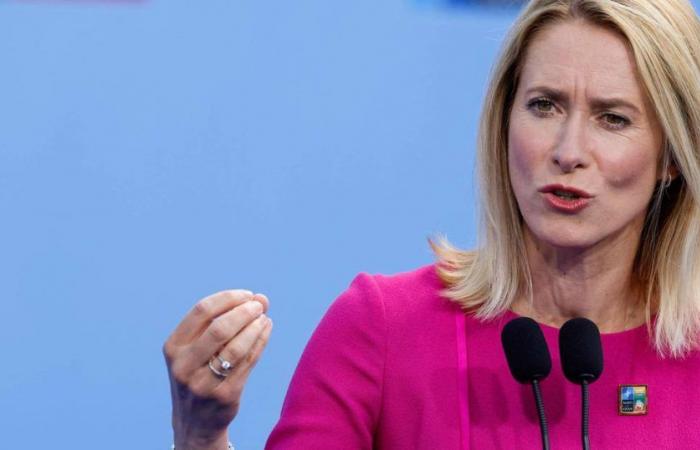– The Estonian government has no intention of Russifying Estonian children and young people. Therefore, we will stop funding Russian-language schools, and switch to a more comprehensive Estonian education.
That is what the Estonian Prime Minister Kaja Kallas told the Riigikogu, the Estonian Parliament, on 15 January.
In Estonia, there are two parallel courses for primary school and upper secondary school. One is the ordinary Estonian school where teaching takes place in Estonian. The second alternative course is taught in Russian.
According to Evhen Tsybulenko, a professor at the Faculty of Law at Tallinn University of Technology, students who have received their education in Russian have worse grades, score worse on tests, and have a harder time interacting with Estonian society, where the main language is Estonian.
Estonia has a large proportion of minority speakers: 27.4 percent of the population speak Russian as their first language. According to Kallas, the aim of ceasing to finance the Russian-language schools should be a wider language community, so that children and young people are more equal in meeting society after education.
– We should have done this a long, long time ago. Better late than never, Kallas said.
Nor is it only Estonia that is considering or has introduced measures concerning the Russian language. Both in Latvia and Lithuania there has been a discussion in recent years.
[ Les også: Russland i FN: Avviser å ha bortført ukrainske barn ]
A Baltic question
In 2018, Latvia introduced a language reform that halted funding of the Russian-language schools. In retrospect, the country has gone even further, and has introduced a ban on Russian at airports, train stations and the like, according to the journal Foreign Policy. The elected representatives then said that the aim was, among other things, to reduce Russia’s influence.
In Latvia, a full 36 percent speak Russian as their first language. Former politician Boris Tsilevitch tells Foreign Policy that Russia’s full-scale invasion of Ukraine in February 2022 has led to accusations of disloyalty against Russian speakers in the Baltic countries.
Experts have said it is difficult to know how many of Latvia’s Russian-speakers actually believe the information they receive about the Ukraine war from Russian authorities. The same applies to how many people support the West. Others believe that banning the use of Russian in public spaces and banning Russian-language media can be counterproductive. The UN has also criticized Latvia and referred to the law as discriminatory against the country’s largest minority group.
Lithuania’s Education Minister Gintautas Jakstas told the Lithuanian news agency Elta that they too are looking at the possibility of closing schools for the Russian minorities in the country.
The statement came after two Russian-speaking youths had shot a fellow student with an air weapon last year. According to the mother of the youth who was shot at, the other two youths should also have played the support song for the mercenary group Wagner. The reason was allegedly that the fellow student did not support the war in Ukraine. The case was investigated by the police.
– At state level, we want to close these schools, as our children grow up in parallel societies. It will be difficult to integrate everyone equally. I think we will be better off if we don’t have our own Russian schools for minority children in the future, said Education Minister Gintautas Jakstas.
All the Baltic countries; Estonia, Latvia and Lithuania have a Russian minority population, but Latvia and Estonia have the most. During the Soviet occupation during and after World War II, thousands were exiled from their homes, while thousands of Russians moved to the region. After the Baltic countries’ declarations of independence and the fall of the Soviet Union in 1991, thousands of Russians remained within the borders of the reborn independent states.
In retrospect, the Baltic countries have forged stronger ties with the West, and all the countries became members of both NATO and the EU in 2004.
[ Les også: Grove voldsvideoer fra Ukraina florerer på nett ]
Does not prohibit teaching
Evhen Tsybulenko, professor at the Faculty of Law at Tallinn University of Technology, writes in an e-mail to Dagsavisen that Russian will not be banned in Estonia’s educational system, but that this applies to the Estonian public school.
– It is important to stress that this is not about banning teaching of the Russian language. It will be possible to study the Russian language in Estonia in the future, as it has always been possible. This is about making Estonian the main language in all state-owned schools, to ensure an equally good common platform for all students.
Tsybulenko points out that there are separate Russian schools in Estonia. Here it is taught in Russian. According to him, students who have attended these schools face language problems when they face higher education and the job market later.
– The PISA surveys also reveal that these pupils get worse general academic results than pupils at Estonian schools, he says.
– They don’t leave school with Estonian friends, and Estonians don’t get Russian friends either. As a result, we get parallel societies, with two completely different language communities that will struggle to communicate with each other.
According to Tsybulenko, students at Russian schools who master Estonian poorly end up in a more Kremlin-friendly language community. He claims that they fall more easily for Russian propaganda, both because they have Russian as their first language and because they feel a cultural affinity.
– Seen in the light of Russia’s invasion of Ukraine, this entails a direct threat to Estonia’s national security, he believes.
[ Les også: Ukraina: Slovakia støtter EUs pakke på 50 milliarder euro ]
Rejects oppression
Tsybulenko believes that Russian propaganda actively promotes the view that this is about the oppression of a linguistic minority, but denies that this is true.
– Many Russian parents in Estonia already send their children to Estonian schools, as they realize that this is the best way to secure the best possible future for their own children in the country, he says.
Russia has previously referred to measures that tighten the Russian language abroad as an attack on Russian culture and the spirit of the people.
Tsybulenko points out that the European Court of Human Rights has in several cases rejected lawsuits with precisely this problem. In connection with a similar case from Latvia, the court wrote that the authorities have an obligation to offer all pupils an education, but that this obligation does not mean that you can demand teaching in any other language than the country’s national language.
Tsybulenko says he does not think Estonians are afraid of invasion, but that they trust Nato and their own armed forces.
– Do you think Russia will assert itself provoked by such a reform?
– I think the only thing that provokes Russia is weakness. Fortunately, more and more people are beginning to understand this, he says.
Russia Ukraine War Culture The ruins of the theater in Mariupol in Ukraine have become one of several symbols of what some call Russia’s cultural war against Ukraine. 300 people lost their lives, Ukrainian authorities estimate, in what Amnesty International calls a war crime. (Alexei Alexandrov/AP)
Culture war
Russia has repeatedly accused Ukraine of deliberately trying to “wipe out” Russian language and culture.
In a meeting of the UN Security Council in March 2023, Russian representative Vasiliy Nebenzia claimed that there is a “linguistic inquisition” going on in Ukraine against the Russian language, which is causing both death and suffering. He also alleged that Ukrainian attacks against separatists in the east of the country are “a proactive and deliberate attempt to destroy Russian language and culture in Ukraine.”
Russian authorities have repeatedly accused Ukraine of “Russophobia”, or xenophobia against Russians and Russian culture, and have used this as one of several arguments for their invasion of the country.
– Since Russia invaded, they have tried to exercise control through measures intended to sow fear and suppress Ukrainian culture and identity. These measures include arbitrary detentions, torture, forced deportations, control of passports, checkpoints, introduction of Russian law, media, education and currency, representatives of the G7 countries wrote in a joint statement last year.
The statement came in connection with a condemnation of staged Russian local elections in occupied regions, which were supposed to ensure Russian legitimacy in the areas.
[ Les også: Tordner mot Putins «galskap»: – Flere kriger i horisonten ]
[ Les også: Lavrovs kraftsalve mot USA: – Alt startet med Bush ]
Keep yourself updated. Get a daily newsletter from Dagsavisen
Tags: Cuts support Russian schools countries measures Dagsavisen
-





